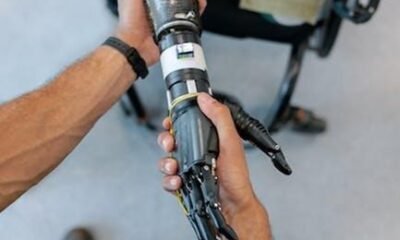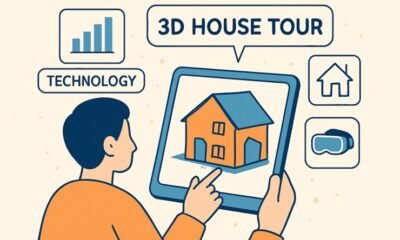Tech
Smart Habit Tracking: AI Alerts for Your Personal Progress Dashboard
![]()
We have all experienced that feeling of excitement when we set a new goal! We start by downloading the latest habit-tracking app, buying a crisp new journal, or sticking a motivational poster on the wall. Whether it is drinking eight glasses of water, meditating for ten minutes, or writing 500 words a day, the initial enthusiasm is a powerful force. We diligently check off the boxes for the first few days, maybe even a week. The streak becomes a badge of honor.
Then life intervenes with a busy day, an unexpected errand, or just plain fatigue disrupts our progress. Missing a day breaks the once-pristine streak. Guilt creeps in, motivation fades, and soon the app or journal is abandoned.
The fundamental flaw in traditional habit tracking is not the intention; it is the implementation that goes a long way. Most systems are passive. They are digital ledgers, patiently waiting for you to report your successes or failures. They are reactive, not proactive. They show you the data, but they rarely provide the wisdom.
But what if your habit tracker could be more than just a passive observer? What if it could be an active, intelligent partner in your journey of self-improvement? Welcome to the new era of personal development, enhanced by Artificial Intelligence. Smart habit tracking, which leverages powerful AI services to provide AI-driven alerts and dynamic progress dashboards, is transforming the way we build a better version of ourselves.
The Limits of the Humble Checkbox
For decades, the core principle of habit tracking has been based on Jerry Seinfeld’s “Don’t Break the Chain” method. While effective in its simplicity, this model has significant limitations in our complex, data-rich world:
- Insight Scarcity: A calendar full of ‘X’s tells you that you did something, but it does not tell you why or how. It does not reveal the hidden patterns. Did you consistently miss your morning run on days following a late night? Did your writing output double on days you meditated? A simple checkbox cannot connect these dots.
- The “All-or-Nothing” Mindset: Breaking a long streak can feel catastrophic, leading many to abandon the habit altogether. This rigid system doesn’t account for the nuances of human life. It punishes deviation instead of encouraging recovery.
- Generic Reminders: “Don’t forget to drink water!” Your phone pings you with a generic reminder at 2 PM. It is the same reminder everyone else gets, regardless of your personal schedule, current activity, or actual hydration levels. More often, these “dumb” notifications become background noise we learn to ignore.
- Reactive Analysis: You are the one responsible for looking at the data and figuring out what went wrong. It requires a level of self-awareness and discipline that is often in short supply, especially when you are already struggling with a habit.
Enter AI: Your Personal Data Scientist and Coach
Imagine having a personal coach who watches over your progress 24/7, understands your unique rhythms, and offers tailored advice at the exact moment you need it. This is the promise of AI-integrated habit tracking. By leveraging machine learning algorithms, these smart systems move beyond simple data logging to provide predictive, personalized, and actionable insights.
The AI does not just see a collection of data points; instead, it recognizes a pattern. It analyzes your inputs of habit completions, journal entries, sleep data from your watch, and meetings from your calendar to understand the intricate web of your life. It becomes your personal data scientist, dedicated to one subject, and that’s you.
This intelligent analysis fuels the two most revolutionary features of modern habit-tracking platforms – AI alerts and the smart personal progress dashboard.
The Power of the Smart Alert: More Than Just a Nudge
The difference between a standard reminder and an AI-powered alert is the same as that between a generic road sign and a GPS offering a real-time detour around a traffic jam. Smart alerts are all about context and timing.
Here’s how they are changing the game:
Predictive Alerts: By recognizing your past patterns, the AI can anticipate future challenges.
- Example: The system notices you almost always skip your 30-minute reading goal on days you have back-to-back meetings after 3 PM. It might send an alert at 11 AM: “Your afternoon looks busy today. It’s a great time to get your reading session in now to stay on track.”
Contextual Alerts: These systems can integrate with your phone’s other functions, like GPS and your calendar, to provide hyper-relevant nudges.
- Example: You have set a goal to go to the gym three times a week. Your phone’s GPS notes that you are driving past your gym on your way home from work, and your calendar shows you have no evening appointments. You might get an alert: “You’re just two minutes from the gym, and your evening is free. Perfect chance for a workout!”
Motivational Alerts: The AI learns what kind of encouragement works for you. Instead of just celebrating a streak, it can frame your progress in more meaningful ways.
- Example: “Great job hitting your water intake goal! This is the 15th day of this month. At this rate, you are building a truly automatic healthy habit.” This reframes the effort from a daily chore to a long-term identity shift.
Course-Correction Alerts: This is where AI truly shines as a coach. When you stumble, it helps you get back up intelligently.
- Example: You have missed your “code for one hour” goal for two days in a row. Instead of a guilt-inducing “You broke your streak!” message, a smart alert might say: “Life can get in the way. How about we aim for a manageable 20 minutes today just to regain momentum? Small wins are powerful.” This approach champions consistency over intensity and prevents total abandonment.
The Intelligent Dashboard: Your Progress Story, Visualized
The second pillar of this revolution is the smart dashboard. It transforms that static grid of checkmarks into a dynamic, interactive command center for your personal growth. It does not stand just as the past record but also as a blueprint for future moves.
An intelligent dashboard provides:
- Correlation Insights: This is the magic bullet. The dashboard can generate charts that overlay different habits and data streams. You might see a clear visual correlation between the days you get 7+ hours of sleep and the days you successfully complete your “no sugar” goal. This data-driven proof is far more compelling than a mere hunch.
- Holistic Well-being Metrics: By integrating with health apps like Google Fit or Apple Health, sleep trackers, and even mindfulness apps, the dashboard can present a unified view of your well-being. It can show how your new meditation habit is impacting your resting heart rate or how your hydration goal is affecting your reported energy levels.
- Dynamic Goal Adjustments: The AI can analyze your performance and suggest data-backed adjustments. If you are consistently exceeding your goal of reading 20 pages a day, it might suggest increasing it to 25. Conversely, if you are consistently failing a goal, it might recommend breaking it down into a smaller, more achievable “micro-habit.”
- Trend Forecasting: Based on your current trajectory, the dashboard can project your progress over the next few months, showing you the powerful cumulative effect of your daily actions. Seeing a projection of how many books you’ll have read by the end of the year can be a powerful motivator.
The Human in the Loop: AI as a Partner, Not a Dictator
It is normal to be concerned about privacy and autonomy. The trick is to see this technology as a partner and not a tyrant. You are always in control. You decide which data to share and which advice to follow. The AI’s role is to illuminate the path and offer intelligent suggestions; your role is to walk this road. The best platforms are built with privacy at their core, ensuring your personal data is secure and used only to benefit you.
The future of personal development is proactive, personalized, and compassionate. We are moving away from rigid, one-size-fits-all systems and toward intelligent frameworks that understand and adapt to our unique human experience. By harnessing the power of AI, we can finally transform our habit trackers from simple scorecards into wise, data-driven companions on our lifelong journey of growth. The goal is no longer just to avoid breaking the chain but to build a stronger, more resilient, and more self-aware you.
-

 Quotes3 years ago
Quotes3 years ago53 Motivational Gym Quotes to Fuel Your Workout
-

 Motivation5 years ago
Motivation5 years ago4 Fun New Hobbies To Try This Year
-

 Quotes10 years ago
Quotes10 years ago50 Most Powerful Quotes Ever Spoken
-

 Quotes2 months ago
Quotes2 months ago100 Motivational Quotes to Inspire You in 2026
-

 Quotes2 years ago
Quotes2 years ago43 Inspirational Quotes About Thoughts
-

 Quotes3 years ago
Quotes3 years ago105 Motivational Quotes by Famous People
-

 Quotes7 months ago
Quotes7 months ago100 Motivational Quotes to Start Your Day with Positivity
-

 Education1 year ago
Education1 year agoHow to Motivate Yourself to Study: 6 Proven Techniques































